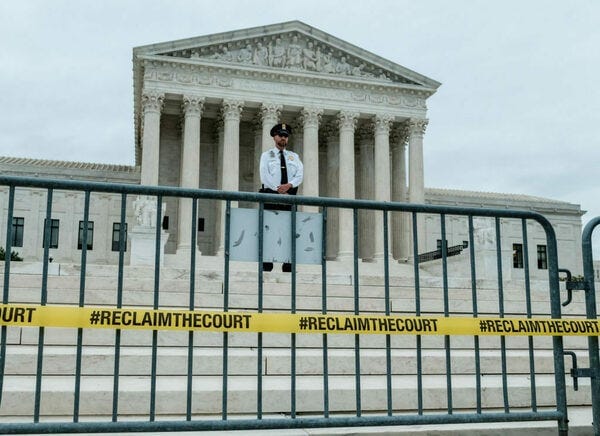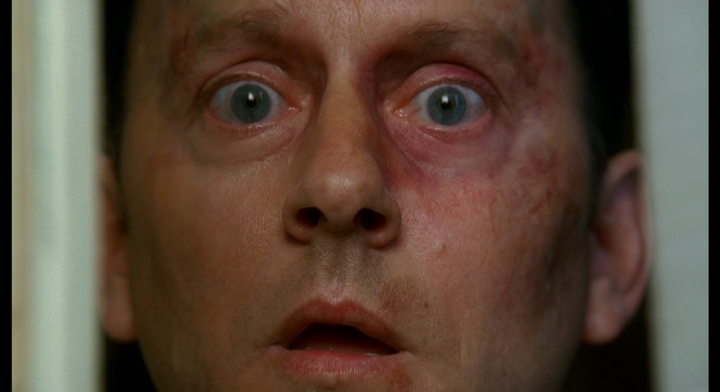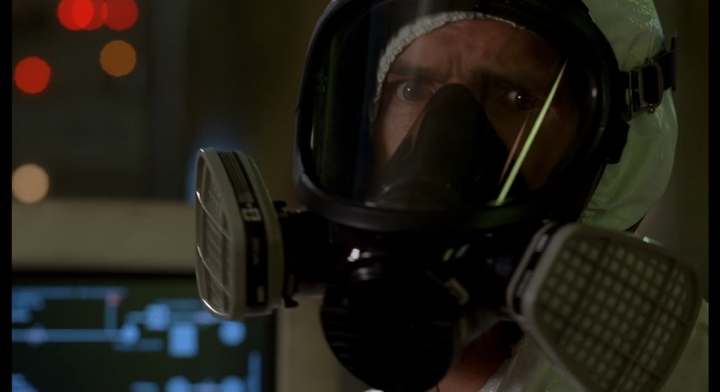Sabotage: Part 1 - The Cost
The act of repair itself has been sabotaged, by people who want to avoid repair’s cost. But what is meant by "broken" and "repair?" What is meant by "sabotage?" And what is the true cost?

Note: this essay was originally published on Revue on July 3, 2022.
Intro | Part 1 | Part 2 | Part 3 | Part 4 |
Part 5 | Part 6 | Part 7 | Part 8 | Part 9 |
Part 10 | Part 11 | Part 12 | Part 13 | Part 14 |
Happy Independence Day! Tomorrow is a day when we ostensibly celebrate our nation’s freedom from the institutional oppression of a government that had decided to abusively profit off of us without adequately representing us, a freedom we secured by rising up as a people and throwing the bastards out, by demolishing the hold their rules and governmental structure had over us, and writing new and better ones for ourselves—not by asking permission or respecting the rules and institutions that oppressed us, but by meeting the danger and shouldering the risk, and fighting for what was already ours.
That’s the story anyway.
What a weird and totally unrelated thing for me to start with. Don’t know where that came from. Where was I?
Ah yes, we’re talking about sabotage. Last time was an Introduction.
This is part 1. I honestly don’t know how many parts this series is going to be by the end—I’m working up a real head of steam here. Still, at the risk of spoilers, I’m planning for the next one to be part 2.
Last time I catalogued a list of terrible things that had broken horribly over the previous three weeks. It was an almost overwhelming list.
It’s been two weeks since then, a span that has delivered unto us an even larger list of things that have been horribly broken—an even more overwhelming one, much of it courtesy of the Evangelical Christian fascists sitting on our hijacked Supreme Court, and the Evangelical Christian fascists—politicians and voters both—who elevated them to this position specifically to break the things they are now breaking, which includes our bodily autonomy, our democracy, our individual rights, and our ability to try to keep the planet habitable in the face of corporate demolition.
And, of course, it all also comes courtesy of the alleged political opposition, institutional Democrats—who seem largely incapable of meaningfully opposing these fascists, because our institutional rules won’t permit it—and institutional Democrats either find circumventing institutional rules a more dangerous proposition than the wholesale destruction of our pluralistic democracy and the habitability of our planet, or because they lack the will to find a path, or both.¹
The things that happened over the last two weeks, it should be said, are overwhelming and devastating precisely because they are going to make so much more harm and death and destruction and menace and malice inevitable—so obviously so, it’s almost as if making destruction inevitable was the intent of the rulings.
These things are wildly unpopular, and yet they’re happening anyway.
Huge majorities oppose them, yet there seems to be no stopping them.
They are hugely abnormal, and counter to all our best ideals for ourselves, and yet many people are instinctively moving to treat them as normal.
As I put it last time:
The root problem appears to be that we can’t get the people who want problems to give us permission to fix the problems, and we can’t get the people who claim to want to fix the problems to stop asking those people for permission.
We can’t fix what’s broken, because the people who want things broken appear to be in charge of deciding whether or not broken things get fixed.
And so I can’t help but wonder why society should keep failing, when so few of us actually want it to.
We want solutions to our problems and yet solutions never come; instead we get exacerbations. Even the hope of solutions seems distant. And so this led to a concluding question, which I want to pick up now.
Here it is:
If we want to see broken things fixed, why can’t we fix what is broken?
And why do the people who want things broken want them broken?
Here’s my diagnosis of what we’re up against: an opposition to repair—an institutional opposition to repair, flowing from an atmospheric, spiritual opposition to repairing broken things, which has sabotaged the very mechanism of repair itself.
We might wonder why people would be opposed to repair.
But first, it might be helpful to establish a definition of what I mean by broken and repair, in terms as simple and obvious as I can manage.
____
“Repair” presupposes something is broken.
How’s that for simple and obvious? If it ain’t broke, you can’t fix it, after all.
Things do break, by the way. Surely we can agree on that much, even when speaking with people who have chosen to inhabit alternate realities of propaganda and conspiracy.
And generally the thing to do with broken things is repair them—that or replace them with something better, which is a sort of repair.
Things break in different ways, but I’d observe the main categories seem to be natural degradation from wear or time, accidental breakage, and deliberate breakage.
I want to talk about deliberate breakage.
If I break your arm with a shovel, that’s deliberate breakage of your arm.
If I lie to you, that’s deliberate breakage of our trust.
If I emotionally attack you, that is deliberate breakage of your peace.
If I steal your car, that’s deliberate breakage of your rightful ownership.
If I pass a law that says you must not be treated as a full citizen under the law, on the rationale that my entrenched bigotry should be recognized and protected as a religious belief, that is deliberate breakage of the shared, foundational, generative value delivered automatically and inextricably by our natural human system, which is what every human society is.
If I overturn a series of laws that protect your treatment as a full citizen under the law, I am engaged in a very similar version of this same deliberate breakage.
We might think of deliberate breakage as abuse: theft, harm, violence, lies, cruelty. We might think of abuse that is strategic to achieve some benefit as corruption. We might think of abuse that is targeted deliberately to cause harm to specific people or groups of people as hate. And, the more powerful the abuser, the more their ability to enforce a reality where their corruption and hate is considered normal and respectable, or even kind and generous.
And (as those of us who have ever observed abusers might note) abusers are often powerful, and their abuse is frequently both strategic and targeted—a combination which, when systemized, we might name oppression.
And it’s all sabotage.
It all makes collapse inevitable.
Think of it like this: repair is a part of a generative sustainable system, and oppression is a part of an acquisitive unsustainable one. Why? Always, oppression actually costs more than repair, because it takes without fixing, harms without helping, hordes for itself what would otherwise be invested in continuance.
Oppressive corruption manifests when an abuser—whether person or institution—gains from something broken, then uses that advantageous position to force somebody else to pay them the much higher cost of not fixing the breakage, rather than paying their own fair share of the much lower cost of repair.
Oppressive hate usually manifests itself, not through overt statements and actions, but when abusers create systems to specifically target the people who should shoulder the burden, based on their own definitions of which people matter and which don’t.
As an aside, I think this is where we often get corruption and hatred wrong.
People will object when we use “hate” in particular, claiming we are taking a reductive view lacking nuance regarding the beliefs or relationships of the individual or institution so charged—but I’d argue this is itself actually a reductive position that lacks nuance regarding the true nature of oppressive hate.
We often think that saying a person or institution is “corrupt” means they are individually unlawful and unrespectable. We often believe that when we say somebody is hateful or part of a hate group that it means they actively individually have hateful thoughts or take hateful actions. Those sorts of bold and overt infractions against basic decency will occur the more things break (as we now see) but that’s not usually how oppressive forms of corruption or hatred work.
Corruption is often legal and respectable. Hatred is often very polite, even nice, to others and even to its targets; often magnanimous, even generous (in specific ways and with specific prerequisites) to compliant individuals within targeted groups. It’s able to be, specifically because the abuser has the advantage to make it so—in fact, it’s usually only when that advantage slips that you see the more recognizable, the more overt and direct manifestations of corruption or hate. If you’ve ever known an abusive person, maybe you know exactly what I’m talking about.
But it’s still abuse. It’s still strategic corruption and targeted hate. It’s still sustained oppression. It’s still deliberate breakage, and deliberate refusal to fix things that break naturally.
Which I’d say is a good working definition of sabotage.
So that’s what I mean when I say broken.
What about repair?
Again, to keep things on a very obvious level, these are the steps to repair: awareness that a thing is broken, a realization of some degree of ownership of responsibility for the repair, a public declaration of the need for repair, actual strategic preparation and realignment of resources and energy to make the repair, and then the repair itself, along with payment of the costs.
My tradition is the Evangelical Christian church. I have words for all these steps that hail from that tradition, which I’ll introduce here now, so I can bring them back some other time.
Here they are: awakening, conviction, confession, repentance, reparation.²
There are a lot of things that aren’t repair that are often taken as repair.
Obviously, when I say repair I don’t mean any of the things that abusive people instinctively do whenever their abuse is exposed: deny that a broken thing is broken, or say that a broken thing has already been fixed when it hasn’t been, or offer any numbers of excuses for why the repair shouldn’t happen, or deflect from the topic of repair by casting blame or pointing out something else that also needs fixing, which they also refuse to fix.
It’s also not a wide range of things that seem aligned with repair.
It’s not simply agreeing that something is broken, with no further steps taken.
It’s not simply saying that a broken thing ought to be fixed, but not moving to fix it.
Being nice to people who suffer the effects of brokenness isn’t repair, and neither is offering them tough love and suggesting they overcome their problems. A workaround isn’t repair. Somebody overcoming oppression through constant daily struggle isn’t repair. A stopgap isn’t repair. People raising money to help an individual suffering the effects of a deliberately broken system isn’t repair. Managing the problem caused by the breakage instead of doing the repair isn’t repair.
Notice, that if you don’t actually fix what is broken—even things that break by accident or things that naturally wear out—then even those natural and accidental breakages eventually become deliberate breakage, the deliberation no less strategic and intentional for being passive. If you’re trying to detect a society that is spiritually and institutionally opposed to repair, you might look, for example, for a nation that has enormous institutional problems finding the political will to fix its own bridges.
How’s this for simple and obvious? Repair involves actually fixing what is broken and paying the cost.
Cost. Ah, yes.
Repair always involves cost—usually money, but also disruption and inconvenience. If you’ve ever experienced road work, or a surgical procedure, you’ll know what I mean. These are natural costs of repair, and the bigger the repair required, the larger the costs.
But also …
… if the thing that is broken is something that was broken on purpose, then the cost for the person who did the breaking is not just their money and their convenience but also their reputation, because repair always involves public awareness of brokenness and its causes.
… and if the someone happens to be profiting from the fact that the thing is broken: the cost is not just their money, their convenience and their reputation, but the loss of their advantage, because repair always involves realigning the present state to allow for broken things to be fixed.
Abusive people and institutions are opposed to repair, specifically because they are opposed to paying any of the costs of repair. In fact, abusive people and institutions insist on making other people pay all costs—money yes, but also disruption, and also inconvenience, and also any loss of reputation or of advantage.
And, because they are abusive and strategic, people opposed to repair make their opposition to repair as advantageous to themselves as possible, by making institutional the problems inevitably rising from their refusal to repair.
And, because they are abusive and hateful, people opposed to repair make sure that the management is as respectable as possible, and involves punishment of the people already targeted by their abuse.
So that’s what I mean when I say repair—and a whole mess of other definitions thrown in, too, at no extra cost. This is the value I deliver, because I love you.
____
I’d end with a few conclusions:
1. When you find people opposed to repair, running and supporting institutions that are opposed to repair, you’ll find that you have a society that is institutionally founded on all kinds of abuse.
2. If you have a society opposed to repair, you’ll find the problems that inevitably attend unrepaired breakage are not solved, but managed: by charities and businesses and fundraisers and prisons and police—a management that will by its very nature always be both profitable to some and punitive to others, until the management becomes the point rather than the repair, until the brokenness itself becomes a load-bearing part of institution, supporting an institutional ecosystem that would cause even further disruption to remove, a self-generating reason to not only keep all broken thing broken—but to break even more things; a self-generating reason not just to to prevent the cost of repair—but to ensure repair is too costly to even consider.
An abusive society is a society optimized to sabotage itself.
It is a society that makes sabotage inevitable.
3. Whenever you find a society opposed to repair, you’ll always find people opposed to paying the cost, and institutions devoted to making other people pay a higher cost.
And, because oppression is unsustainable, over time you’ll find more and more things broken, and fewer and fewer people controlling more and more wealth and power and advantage, and everyone else paying a higher and higher cost for it.
4. Blame is a major cost of repair. If you want to detect abusive people within an abusive society, see how blame works. You will find that the more people are to blame for what is broken, the harder they will work to establish that they are blameless.
And that’s next time.
___
¹Actually, they’re mostly asking us to fix it, by staying alive until November’s election and then helping them stay where they are, and adding more of them to the seats of power. And we’ll try, guys, we’ll try. We don’t seem to have much choice. No, no, don’t get up. You’re exhausted. You just had a long vacation, and another one coming, and those donor emails must take forever to write.
²I will note, my fellow Evangelical Christians don’t seem to be making much use of these steps, so what say we take them away for our own use? I wonder how long it will take them to even notice they’re gone.
_____
A.R. Moxon is the author of The Revisionaries, which is available in most of the usual places, and some of the unusual places. He can’t stand rocking while he’s in here, cuz your crystal ball ain’t so crystal clear.




Comments ()